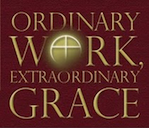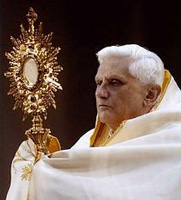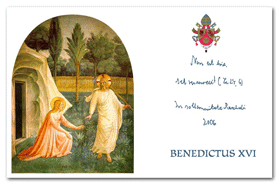The Liturgical Dignity of Work
I love this passage from Supreme Knight Carl Anderson’s book Called to Love: Approaching John Paul II’s Theology of the Body. I think it corresponds nicely to Opus Dei’s focus on the sanctification of one’s work:

The body enables man to respond creatively to the world and to God – and to respond is to be responsible. There is no true freedom without responsibility.
We learn to appreciate the link between freedom and responsibility through work. We can even define work as man’s way of giving the material world a share int he dignity of the human body. To work is to give the world a human shape.
Nevertheless, because we work in our bodies, our labor isn’t purely external to us. Nor is its value simply the sum total of what we produce. The quality of work is not measured only by the quantity of the objects our work may produce. John Paul II, who put in countless hours of manual labor in a Polish factory, was very sensitive to the impact of work on the worker himself and on the development of his character – and impact the pope called the “subjective” dimension of work (Laborem Exercens, 6) Because man works in his body, whenever he transforms the world through work, he is also transforming and molding himself. How, since man’s life is a journey toward God, the work by which he shapes his life is a kind of “liturgy” (which comes from the Greek work leitourgia, meaning “work of the people”). To work is to shape the world into a reflection of our relationship with God; it is to incorporate the world into our worship. Every human action, every work man performs, no matter how humble, has a liturgical dignity. (p.36-37)
Recommended:
Sanctifying ordinary work: quote from St. Josemaria
The Sanctification of Work
Ordinary Work, Extraordinary Grace
 Today is the feast of St. Joseph the worker who is an excellent model for Opus Dei. He was regarded in the Bible as a good and just man and was referred to by his profession (“is this not the carpenter’s son?” Mt. 13:55). The emphasis on Joseph’s work in the Bible and throughout tradition speaks to the importance of our own work in the world.
Today is the feast of St. Joseph the worker who is an excellent model for Opus Dei. He was regarded in the Bible as a good and just man and was referred to by his profession (“is this not the carpenter’s son?” Mt. 13:55). The emphasis on Joseph’s work in the Bible and throughout tradition speaks to the importance of our own work in the world.
 Yesterday I posted this quote from St. Josemaria:
Yesterday I posted this quote from St. Josemaria: The Pope had a wonderful message of peace for Easter. Here’s an excerpt from his Urbi et Orbi:
The Pope had a wonderful message of peace for Easter. Here’s an excerpt from his Urbi et Orbi: